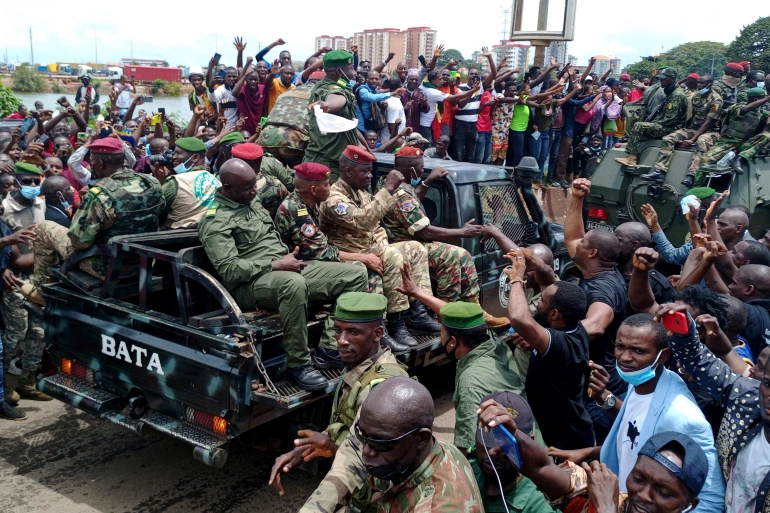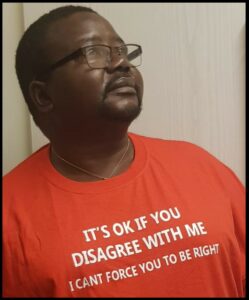Since the military uprising, sorry the coup in neighbouring Guinea, Sierra Leoneans have inundated social media with their views, feelings and interpretations of the whole saga, some even with wishful thinking. Notwithstanding the geographical proximity between Sierra Leone and Guinea, both countries share inextricable DNA in social, tribal, religious and to a large extent cultural affiliation. It is not surprising therefore, that any time one of them sneezes, the other is expected to catch the cold. It is no wonder that the comparisons have been coming thick and fast. Unsurprisingly this time, much of these have been on the political topographies of both countries, which have captured the attention of the social media brigade.
Alpha Conde stands accused among many others, of tribalism and corruption. During the last presidential election, both Conde and Cellou unfortunately milked their tribal sentiments for all their worth, much to the demise of national cohesion. The tribal dichotomy between the Madingo and Fulani in Guinea goes beyond flesh wound. The evidence of partisan animosity did not go unnoticed, as most of the ballots cast were reportedly along linguistic alliances. Conde’s removal was largely greeted with jubilation by the Fulani people. The Fulani claim to have been the victims of Conde’s tribal culling. He has been accused of “de-fulanising” all branches of the government and replacing them with his own tribal affiliates. It pains me, though unavoidable, to talk about such divisions, as they only give oxygen to an unfortunate status quo.
History shows us that coup d’états always get instantaneous “acceptance” from the masses. Sometimes, such acceptances can be misread as tacit support. Notwithstanding the plebeian nature of such “support”, in most cases, it demonstrates the angst against the ousted regimes but not necessarily in support of the coup makers. Sometimes, shared hatred can form the basis of friendships, but only before the dust has settled. They tend to serve as release valves from the choke hold of repressive regimes. As they say in politics, elections are won by men and women chiefly because most people vote against somebody rather than for somebody.

With such a dichotomy, some see the coup as a redemption, while others see it as the work of an ingrate. Take your pick. Mamadou Doumbouya may have provided a political aphrodisiac for some; but for how long is another matter. On the other hand, some have just been treated to a theme in the classical Julius Caesar. Accusations of “fis ree wali” (ungrateful) have been raining down the other side of the aisle. Video clips from the Conde brigade have threatened to ostracise their own son, for what they see as the ultimate betrayal. How this sits with the Cellou brigade is hard to say, for some might just conclude in the end that this is a case of “John troway nut oil pan John en res”- “Neneh gorthor, Baba gorthor”. Whether they see this coup as the same car with the same number plate, but a different driver remains to be seen.
It is such thought processes that have kicked the conspiracy theorists into gear. Some believe that the whole coup was an orchestrated concoction with Conde’s blessings. Some see the apparent blood like relationship between Conde and Mamadou as too close to be true; and question whether Mamadou would do an “et tu brute? Ironically, it is the same premise that has drawn disappointment and condemnation, in part, for Mamadou.
The support for the coup may appear overwhelming but meanwhile, the coup plotters and especially Mamadou Doumbouya may just find themselves in a no-win situation. Is he between a rock and a hard place? Either way, would Mamadou run the risk of being a political orphan? Looks like a lot would depend on the configuration, policies and any other reconciliation efforts that would ensue in the coming days and months. Inspite of his tribal alliance to Conde, there are some who would see his action as “putting the country above tribe”. No matter your political persuasion, “a military coup needs sacrifice and courage that you can’t find in an army without morale (Jalal Talabani)
In a press release by the opposition party, National Alliance for Democratic Alternation (ANAD), Cellou as leader stated that the CNRD “can count on the support of ANAD in the effort to build a peaceful democracy in our country”. The release cites the motives on which its (CNRD) saving action matches ANAD’s aspirations to bring the nation together and rebuild the state. This can be so reassuring to all peace-loving and well-meaning citizens of Guinea. Many would hope that Mamadou will not shake hands with ANAD with clenched fists.
What does the coup in Guinea mean for the surrounding kindred, and especially Sierra Leone? One way to gauge the temperature is to look at how fake news about the death of opposition politician Kamarainba has been making the rounds. It forced the office of Correctional Office to issue a press release countering the reports. He has since been granted bail.
What lessons, if any can Sierra Leone learn from the Guinea debacle?
Unlike Guinea, Ernest Koroma served his two term limits and handed over according to the constitution. Whether he was pushed or did so reluctantly matters less; for this puts Conde’s recalcitrance into perspective. President Bio has made certain strides on his promises, but like Conde, the jury is still out on his fight against corruption. The irony is that Bio’s fight against corruption paradoxically engendered one of the most widely spoken accusations of his government. With most APC members, thanks to their previous job descriptions, being central to the microscope of the Commission of Inquiry, it didn’t take long for the opposition to cry tribalism.
Like Conde, his government has been tagged with accusations of corruption, nepotism, regionalism etc. While some stalwarts have tried to deflect the accusations that it is logical for any incoming government to choose its own workforce based on shared aspirations, others accuse the government of doing so along tribal and party card carrying blood lines. Others think that Maada is no different from Ernest Koroma, who is also accused of populating his government and civil service with “northerners”. Those who use this excuse as justification for tribalism in our country tend to forget that “an eye for an eye only makes a country go blind”.
Unlike Guinea, our scars are yet to heal from our brutal civil war. No sober-minded citizen would wish a return to those dreadful days of barbarism. That is why it was so disheartening to hear some people calling for upheaval and civil war on social media. Guinea and Sierra Leone may share a lot in common; hardship, high cost of living, high unemployment, corruption, nepotism, tribalism, me- ism, we- ism and all the isms in the world. But Sierra Leoneans could decide in 2023. Those who advocate a short cut to this process may want to reconsider such wishful thinking.

Guinea and Sierra Leone are brethren, just like the baboon and the gorilla. But the baboon is a baboon and the gorilla is a gorilla. Even at its controversial best, the coup in Guinea has been widely acclaimed for standing up in defence of democratic principles. That does not naturally mean that the majority prefer military rule, but if that is what it takes to protect the constitution, so be it.
Every national constitution primarily gives its people the right to pursue happiness. If the essence of life is the pursuit of happiness, then tampering with the constitution is tantamount to tampering with the happiness, and in effect the essence of life. Confusing? Try converting one thousand Leones to one Leone.
Don’t forget to get your Marklate.


Be the first to comment